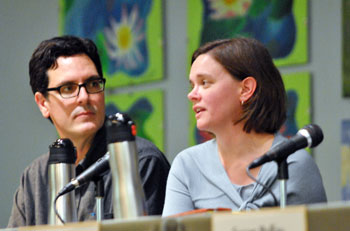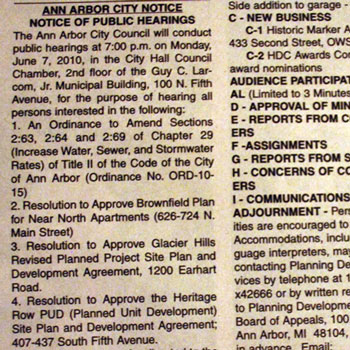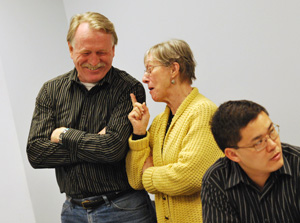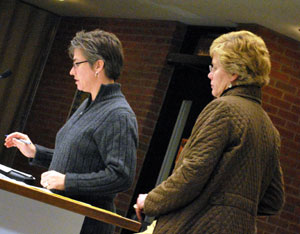How do Ann Arbor’s land use policies affect where people live and work, and the way they get from one place to another? What is the city doing to support sustainable approaches?

Joe Grengs, a University of Michigan associate professor of urban and regional planning, and Ginny Trocchio, who manages the city's greenbelt program, were among the speakers at a Feb. 9 sustainability forum.
Issues of land use and accessibility were the topic of a sustainability forum on Feb. 9, the second in a series that’s part of a broader city sustainability initiative. During the forum, city staff also unveiled a set of draft goals for Ann Arbor related to four general sustainability themes: Resource management; land use and access; climate and energy; and community.
Wendy Rampson, head of the city’s planning staff, told the audience that the 15 draft goals were extracted from more than 200 that had been identified in existing city planning documents. The hope is to reach consensus on these sustainability goals, then present them to the city council as possible amendments to the city’s master plan.
Speakers at the Feb. 9 forum included Joe Grengs, a University of Michigan associate professor of urban and regional planning; Susan Pollay, executive director of the Ann Arbor Downtown Development Authority; Eli Cooper, the city’s transportation program manager and member of the Ann Arbor Transportation Authority board; Jeff Kahan of the city’s planning staff; Ginny Trocchio, who manages the city’s greenbelt program; and Evan Pratt of the city’s planning commission.
A Q&A followed presentations by the speakers and covered a wide range of topics, including thoughts on the proposed Fuller Road Station. The following day, Feb. 10, the city and University of Michigan announced plans to halt the initial phase of that controversial project – a large parking structure near the UM medical campus.
The topics of the series of forums reflect four general sustainability themes: Resource management; land use and access; climate and energy; and community. The first forum, held in January, focused on resource management, including water, solid waste, the urban forest and natural areas.
All forums are held at the downtown Ann Arbor District Library and are being videotaped by AADL staff. The videos will be posted on the library’s website. Additional background on the Ann Arbor sustainability initiative is on the city’s website. See also Chronicle coverage: “Building a Sustainable Ann Arbor,” and an update on the project given at the November 2011 park advisory commission meeting. [Full Story]







